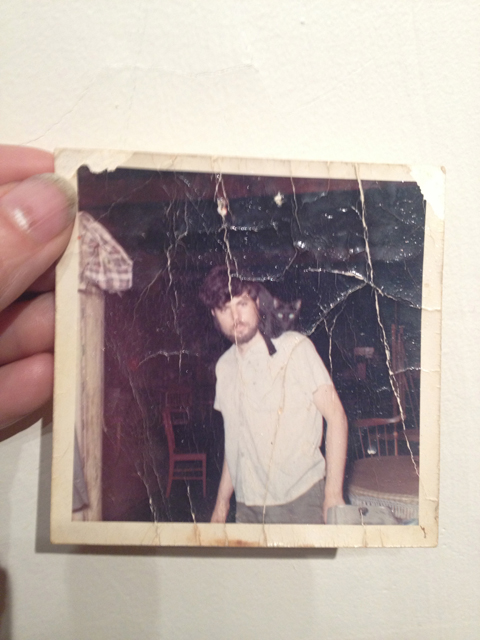JUSTINE KURLAND
FATHER’S DAY
— My father, Bruce Kurland, died this past December. He had been a painter who lived in obscurity and poverty. A combination of bad temper and integrity had alienated anybody who might have been able to help his career. He would sell directly to a handful of collectors as soon a painting was completed, but each one took a long time to make. Whenever he received a check he said it was like finding Jesus in his mailbox.
Bruce had two Sagittarius daughters (Hannah and myself) and one Ares daughter (Yetta). The day he died the sun was in Sagittarius and the moon was in Ares. But really, Yetta was more like the son, and became the man of the house after my parents divorced.
I have blurry memories of being little and visiting my father, waiting for him to come down from his attic studio in an old, spooky farmhouse. I remember the waiting more than what happened after he did come down, I suppose to make us dinner or put us to bed.
In those summer days there was the sensuous pleasure of walking on the hot country roads, popping tar bubbles with bare feet. There were the sandy tongues of the neighbor’s calves licking the salt from my hands. Or the cruel pleasure of catching clumsy cluster flies in the dirty chiffon curtains and the satisfying sound of their bodies’ crunching against the window.
I tend to remember the stuff surrounding my father more vividly than the times he came out of his studio: his Audubon book of birds of North America; the World War II model airplanes he meticulously crafted; and the silk strings and feathers used for tying flies for fly fishing. The duck decoys, a deer being butchered on the kitchen table, the carousel patterned wallpaper, browned and peeling.
Against these images I can hear the string of tenets my father would repeat ad infinitum, a belief system he handed down:
ON ART: “The problem with Abstraction is that it presupposes there is a god. But do you know what? No matter how abstract it got they always got the tits right.”
And with a book of Chardin’s paintings on his lap, his eyes squinting against the burning cigarette smoke, “Have you seen this painting. Look at it. Now that guy knows how to paint.”
ON PHOTOGRAPHY: “Do you know who is a goddamn photographer? Vermeer is a photographer. He painted goddamn light.”
ON THE ART WORLD: “Whatever you do is fucking for money.”
ON FEMINISM: “Don’t give your power to some man. That’s what every woman in your family has done.”
ON FAMILY: “I understand if you don’t want to spend time with me, I never wanted to spend time with my parents.”
One of the surprising things is that since my father died, I have spent a lot of time with him. In some deeper sense than I could have ever imagined, my father lives inside me, which reveals not only my father but also the fallacy that when we die we are dead and gone. Rather he is both utterly gone and still here. My father lives in me not simply through memory, not as the neurotic rehashing of childhood narratives, not as the persecutor of my psyche, nor as lineage or legacy, but as an intimacy that surrounds me. As something like love. I can see him leaning in the doorway with a cup of coffee in one hand and cigarette in the other, devastatingly handsome even with stains on his clothing and his cheap, worn shoes.
The other thing my father often repeated was his memory of being a little kid, the moment he drew a picture of a circle and realized everything inside the circle was something and everything outside the circle was nothing. Whatever joy he found in that act of creation is what sustained him the rest of his life. He rarely had relationships, was estranged from his family, and could count his friends on one hand, but in his paintings he could communicate the richness of his experience with an intensity so exquisite, so close to the bone, so goddamn beautiful.
Shortly after he died my semester of teaching ended and I began my habitual winter road trip. I listened to Marc Ribot’s Music for Silent Films on repeat and rarely stopped the car for the entire month. I was fueled by bloated emotions underscored by anxiety. I became my car and we were running as fast as we could. I made it all the way to Los Angeles, where the jangled raw nerve of the city met my own, and then flew home.

—
Justine Kurland was born in 1969 in Warsaw, New York. Her work has been exhibited extensively at museums and galleries in the U.S. and internationally. Recent and upcoming museum exhibitions include SOFT TARGET, at M+B, Los Angeles; LOOKING FORWARD: GIFTS OF CONTEMPORARY ART FROM THE PATRICIA A. BELL COLLECTION, at the Montclair Art Museum in Montclair, NJ; MORE AMERICAN PHOTOGRAPHS, at the Wexner Center for the Arts in Columbus, OH; and OFF THE GRID #1 and #2, at Fotodok in The Netherlands. She was the focus of a solo exhibition at CEPA in Buffalo, NY, in 2009. Her work is in the public collections of institutions including the Whitney Museum, the Guggenheim Museum, and the International Center of Photography, all in New York; the Corcoran Gallery in Washington, DC; and the Museum of Fine Arts in Montreal. In 2013, she was awarded The New York Foundation of the Arts’ Artists’ Fellowship for Photography. Her latest show, SINCERE AUTO CARE, opens in September at Mitchell-Innes & Nash, New York.
